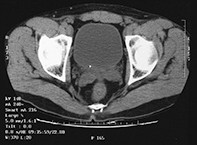Peer Reviewed
Feature Article Renal medicine
Investigating the patient with renal colic
Abstract
Renal colic is the classic presentation of renal and ureteric stones, and requires appropriate investigation. It is primarily a surgical problem – particularly in the acute phase – and investigation and management are usually performed by a urologist.
Key Points
- Although haematuria is seen frequently with renal stones, a normal dipstick examination or urine microscopy result does not rule out stone disease.
- Measurement of electrolytes, urea and creatinine levels in serum will quickly show if significant renal impairment is present. Calcium and uric acid levels can be checked on the same sample.
- Noncontrast spiral CT is the investigation of choice for the patient with renal colic. It will also show up radiolucent stones (typically uric acid stones), which can easily be missed by other investigations.
- An intravenous pyelogram is a good test when spiral CT is not available.
- Abdominal ultrasound is the investigation of choice for pregnant women with renal colic.
Purchase the PDF version of this article
Already a subscriber? Login here.

